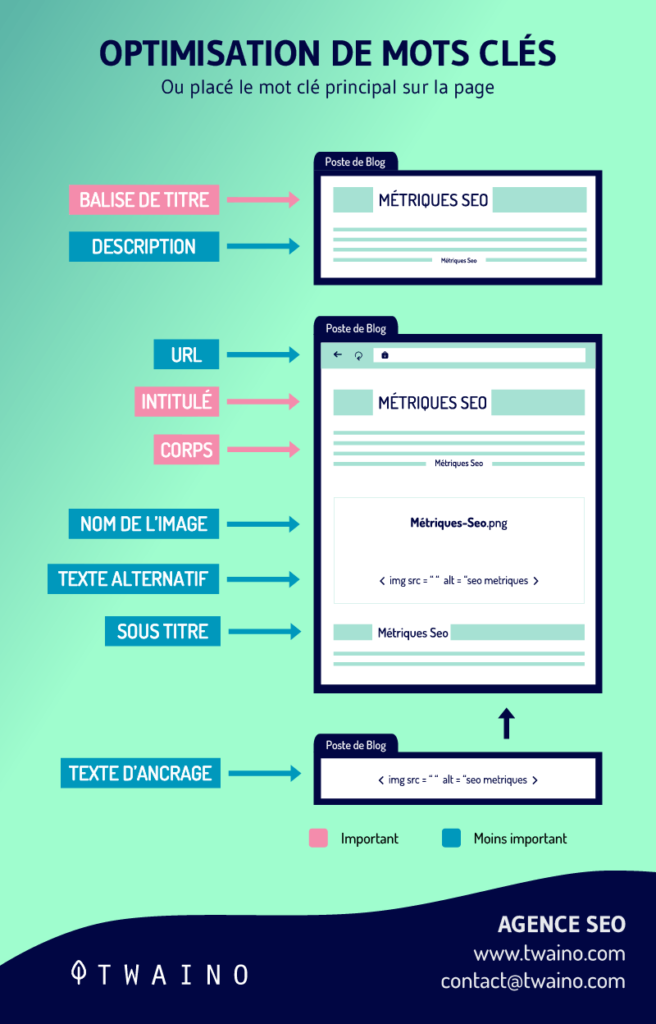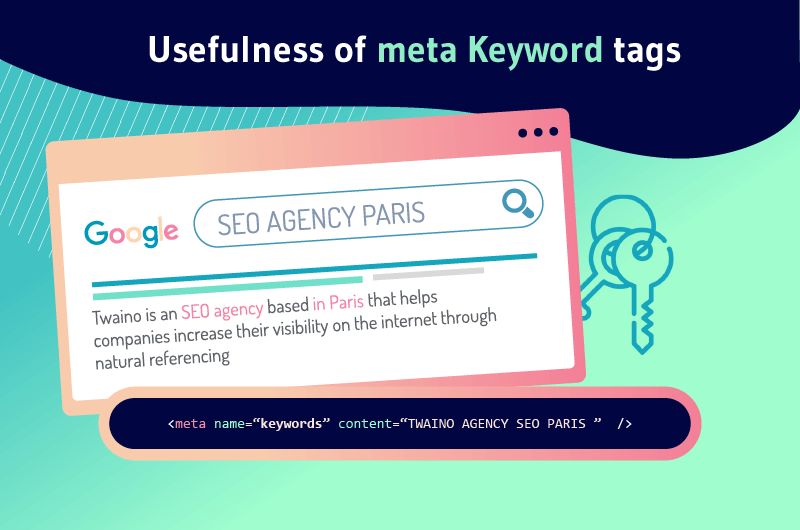The use of the meta keyword tag is a controversial topic in the SEO world.
Some believe that it is still useful, while others claim that it has lost its importance over the years.
So, the question that arises is this:
Is the meta keyword tag still useful for optimizing the SEO of a website?
To answer this question, let’s explore the most compelling arguments and determine if the meta keyword tag is still worth considering for improving online visibility.
What are meta keyword tags?
Meta keywords are an HTML tag that allows web marketers to provide a list of relevant key terms to optimize their pages.

These keywords are used to help search engines understand the page content and include it in relevant search results.
Meta keywords are usually located in the header of the HTML page, and are generally used as a way for site owners to communicate to search engines the important topics on their page.
However, it is important to understand that these tags no longer influence the ranking of a site on the SERPS according to the web giant, Google.
This is because many site owners have started to abuse meta keywords by including irrelevant keywords or using repetition techniques in an attempt to manipulate search results.
However, meta Keyword tags are still very useful with other search engines:
- Bing
In 2014, Bing published on its blog that the meta keywords tag was no longer useful in terms of search engine optimization (SEO). This statement was confirmed in 2020 when Bing’s head of promotion reiterated this claim on Twitter.

It is therefore clear that the use of this tag will no longer have any positive impact on the ranking of a website in Bing’s search results.
Nevertheless, in 2011, it was argued that Bing could use meta keyword tags as a signal to detect poor quality content.
It’s not clear if this will still be in effect, but it certainly isn’t a determining factor in search result rankings.
- Baidu
In 2012, a Baidu engineer stated that meta keywords were considered unnecessary and ignored by their ranking system. However, an updated page in April 2020 states that titles, descriptions, and keywords are important in assessing a page’s relevance to Baidu.
Therefore, it is reasonable to conclude that the keyword meta tag could still be considered as a ranking factor by Baidu.
- Naver
Naver, a search engine in South Korea, handles most of the internet searches in that country. According to figures from Wikipedia, Naver handles 74.7% of all web searches in South Korea.
There is no mention of the meta keywords tag in Naver’s documentation for website optimization. Therefore, it is likely that Naver does not use it or that it has little impact on search results.
- Amazon
If you examine the HTML source code of a web page on Amazon, you may notice the use of the “keywords” meta tag.
However, it is highly likely that these keywords are only used for Amazon’s internal search engine and not to improve ranking on external search engines such as Google or Bing.
- Yandex
Yandex is the search engine that replaces the giant Google in Russia in terms of popularity, although it is also used alternately.
Although Yandex’s official documentation states that meta keywords can be used to determine a page’s relevance to search queries, most Yandex SEO experts believe that meta keywords are not a significant or proven ranking factor for Yandex.

It is crucial to keep in mind that Yandex’s ranking algorithms can be constantly changing. Therefore, it is imperative to stay up to date with the latest trends and updates in order to maximize the performance of this search engine.
How do I benefit from Meta Keyword tags?
Although the major search engines no longer use the meta Keyword tag as a ranking signal or not at all, experts believe that it has indirect benefits for website owners who still use it.
Some even believe that online marketing giants use this tag to gain a competitive advantage.
With that, here are some benefits you can still get from it:
Meta Keyword tags allow you to indicate important topics
Meta keywords allow webmasters to indicate to search engines the important topics of a web page, using relevant keywords.
For example, if a page is about hiking in the mountains, the meta keywords could include terms such as ”hiking”, ”mountain”, ”trekking”, etc.

This means that if a user performs a search for “hiking in the mountains”, chances are that the page including these keywords in the meta keywords will appear in the results, thus increasing the chances of the user clicking on that page.
Search engines would then use these keywords to better understand the meaning of the page’s topic and to determine its rank on the SERPs.
Keyword tags help to understand the content of the page
Meta keywords can enhance the effectiveness of search engines by providing them with an in-depth understanding of the content of a web page.
This allows them to better identify the topics covered by a web page in order to define its positioning on SERPs.
When analyzing the page, search engines carefully study its content to capture all relevant aspects.
They use techniques such as keyword density analysis to understand the important topics on the page.

For example, if a page is about hiking in the mountains, the meta keywords might include terms like “hiking”, “mountain”, “trekking”, etc.
The search engines then leverage these terms to better understand the meaning of the page’s topic and to include it correctly in their database.
This ensures that the page ranks in search results for relevant topics, increasing the chances that users will find the page by searching on those topics.
Tags allow you to target specific key terms
Meta keywords allow webmasters to target specific terms to improve a page’s ranking. By including relevant keywords in meta keywords, webmasters could increase their page’s chances of ranking in search results for those keywords.
Webmasters can maximize their page’s rank on the SERPs by selecting relevant key search terms and including them in their page’s meta keywords.
This strategy can significantly affect the page rank on SERPs since the indicator bots rely on this information to examine relevance.
For example, if a webmaster wants his page to rank in search results for the keyword “mountain hiking”, he can include this keyword in the page’s meta keywords.
The meta keyword tag facilitates the search
The meta keywords could make the search easier for users by using the meta keywords as keywords for the search results.
This could make it easier for users to find web pages that contain information on specific topics.
Meta keywords could make it easier for users to search by using meta keywords as keywords for search results.
Users could perform searches using the keywords included in the meta keywords, making it easier for them to find pages that contain information on specific topics.
For example, if a user is looking for information about hiking in the mountains, they could search using the keywords “hiking” and “mountain”, and the search results will include pages that have these terms in their meta keywords.
The meta keyword tag helps with search engine optimization
Using meta keywords was considered an optimization practice for search bots by leveraging relevant key terms to affect the positioning of a page on SERPs.
This could increase the visibility of the page and the chances to attract targeted traffic.
The use of meta keywords was considered a search engine optimization practice, as it allowed webmasters to target relevant keywords to improve their page’s ranking in search results.

This could increase the visibility of the page and the chances of attracting targeted traffic to the page.
In addition, optimizing meta keywords could help improve the page’s ranking in search results for specific keywords, increasing the chances of driving qualified, targeted traffic to the page.
It could also increase the chances of conversions and sales for e-commerce sites or online businesses.
It is important to note that these benefits are no longer valid today, as most search engines no longer use meta keywords to rank pages in their search results.
It is therefore more important to focus on the quality of the content and the quality of the links pointing to a page, rather than on the meta keywords to improve SEO.
How to include meta keyword tags in your strategies?
Since SEO is still based on keywords, meta keyword tags can still give you a competitive advantage.
The most important thing is to use it in the best possible way.
To do this, here are some tips for you:
Use relevant key search terms for your content
It’s crucial to use terms relevant to the topic of your page to optimize its discovery by crawler bots.
For example, if your page is about family vacations, you should use keywords such as “family vacation”, “kids vacation”, “family vacation destinations” etc.
These keywords will tell search engines that your page is about family vacations, so they will be more likely to show it in search results for queries related to those terms.
Use keyword variations
Search engines can be more sensitive to synonyms and related terms, so it’s important to use keyword variations in your Meta tags.
For example, if you use the keyword “family vacation”, you could also use terms like “family travel” or “family vacations” to cover more search queries.
This allows you to reach a wider audience and be visible for queries related to related terms.
Use key phrases
Key phrases can be more effective than simple keywords, as they can give search engines more context.
For example, instead of using a keyword like “family vacation”, you could use a key phrase like “Best family vacation destinations”.

This tells search engines that your page is about the best destinations for family vacations, so they will be more likely to show it in search results for queries related to that phrase.
Use a limited number of keywords
There’s no need to overload Meta tags with dozens of keywords.
In fact, it may even be counterproductive, as search engines may consider that you are trying to cheat by using a large number of keywords.
So it’s best to limit the number of keywords you use to a reasonable number, focusing on the most relevant keywords for your content.
Use meta tags for each page
When you use meta tags for each web page, it allows you to ensure that each page is optimized for search engines, and to maximize your chances of being visible for queries related to your content.
So you need to make sure that the Meta tags are specific to each page. This means using different keywords and key phrases for each page, depending on its content.
This ensures that search engines understand what each page is about and can show it in the appropriate search results.
Use key terms in page titles
Page titles are an important part of Meta tags, as they give search engines a clear indication of what the page contains.

Therefore, it is important to use relevant keywords in page titles. For example, if your page is about family vacations, you should include keywords such as “family vacation” or “family vacation destinations” in the page title.
Use the power of header tags
Tags like these are a key element to effectively organizing your content and improving its readability for search engines.

Therefore, it is important to use header tags to structure your content and to include relevant keywords in these tags.
Use Alt tags for images
Alt tags are used to describe the images on your page, which is important for search engines that cannot “see” images.

So it’s important to use Alt tags for images and to include relevant keywords in those tags.
For example, if you have an image of a family vacation, you could use an Alt tag like “family vacationing on the beach”.
Conclusion
In conclusion, the meta keyword tag is no longer considered a crucial factor for SEO in Google’s algorithms in particular.
In fact, some SEO experts even claim that its use can be counterproductive due to the abusive practice of inserting keywords without relevance to the page content.
However, it’s not totally useless to use them, especially if you have specific keywords to include on your page to boost relevance for search engines.
Ultimately, the importance of the meta keyword tag depends on each website’s SEO strategy and its specific needs. Basically, the meta keyword tag is no longer a determining element for SEO, but can still be used wisely to enhance search engine relevance.



